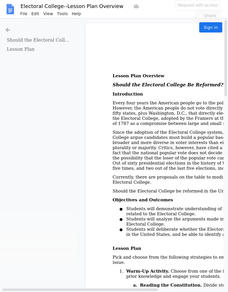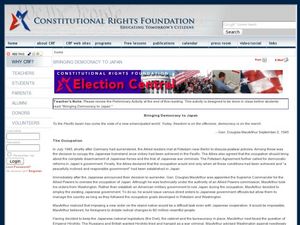Curated OER
Donkeys and Elephants and Voters, Oh My!
Students celebrate party politics. In this American politics lesson, students discover what the 2 main political parties in the country are and discuss their functions. Students then participate in a classroom simulation that requires...
Curated OER
Unit 1: Building Historical Background Knowledge: The Road to Revolution 1754–1776
What were the conditions that led to the American Revolution? What are the conditions that lead to revolution in other times and places? Class members examine primary source materials and use evidence drawn from these documents to craft...
Curated OER
Democracy…Not Yet!
Students analyze the concept of democracy. In this democratic values lesson, students analyze the lyrics of selected popular music that address issues that challenge the role of United States as a world leader. Students create exhibits...
Curated OER
American Government Worksheet 1
In this American government worksheet, students respond to 12 true/false, 11 alphabetical order, 15 fill in the appropriate articles, 15 matching, and 1 cryptogram about the structure of the American government.
National Endowment for the Humanities
Common Sense: The Rhetoric of Popular Democracy
Students identify important arguments for independence made in Thomas Paine's Common Sense. They explain why these arguments helped persuade American colonists that independence was necessary. Students describe the importance of Common...
Curated OER
The Right Choice
Students examine the leadership role of George Washington in the American Revolution. In this George Washington lesson plan, students read selections titled "Generalship," and "Candidate for Commander-in-Chief." After students read the...
Curated OER
Americans Who Stood Up for Their Beliefs
Students will reflect upon the use of music to teach lessons throughout history. The focus of the study is based upon early American History. The tie of music and the abolition of slavery makes for interesting inquiry for learners.
DocsTeach
The Civil Rights Act of 1964 and the Equal Employment Opportunity Commission
1964: A victory for the civil rights movement! Scholars read a section of the Civil Rights Act of 1964 and discuss what affirmative actions means to them. The resource is a jigsaw activity, with each group focusing on one section of the...
National Woman's History Museum
Fannie Lou Hamer and Social Activism
Not all heroes wear capes. An impactful lesson focuses on the life and activism of Fannie Lou Hamer during the civil rights movement. Scholars read her speeches and other material, participate in group discussion, and complete a jigsaw...
Curated OER
The Articles of Confederation (1781-1789)
In this online interactive history instructional activity, learners respond to ten short answer and essay questions about the Articles of Confederation. They may check some of their answers on the interactive instructional activity.
Judicial Learning Center
The Judge and the Jury: Trial by Jury
Why is it so important to have a trial by jury in the American judicial system? This right is one of the hallmarks of American democracy, but it also comes with the responsibility of serving on a jury if called. Young legal scholars...
C-SPAN
Electoral College
Most people are surprised to learn that American democracy is not as direct as they thought. Using a package of guiding questions, charts and curated videos, learners unpack the unique American institution of the Electoral College. The...
State Bar of Texas
White v. Regester
One vote doesn't really matter, right? Class members investigate the concept of voter rights and restrictions using the 1973 Supreme Court case White v. Regester. They view a short video and work in pairs to analyze how people create...
National Endowment for the Humanities
A Defense of the Electoral College
Each presidential election year, the debate about the electoral college rages. Michael C. Maibach's "A Defense of the Electoral College" offers young political scientists an opportunity to examine a reasoned argument for why the...
Annenberg Foundation
Electoral Politics
You won't just get a lesson when you click on this resource. As you click on the related resources located to the left of the screen, you'll find, a professional development video, teacher/student notes, lesson plan, and related...
Curated OER
Strengthening Democracy In Latin America
High schoolers consider how to strengthen democratic principles in Latin America. In this government systems lesson, students explore the challenges to democratic forms of government in Latin America as they examine primary sources. High...
Curated OER
Fighting for Democracy, Fighting for Me
Students explore what it means to be American. In this American identity instructional activity, students consider the contributions of Americans throughout history that have protected the promises of the U.S. Constitution.
Curated OER
Government: The Mystery Epidemic
Students are able to identify some roles of government in dealing with the prevention and treatment of skin cancer. They are able to list two reasons why the occurrence of skin cancer in youths has increased.
Curated OER
The Progressives and Direct Democracy
Students analyze the Progressive Movement. In this Bill of Rights activity, students listen to their instructor lecture on the Progressive Movement and direct democracy. Students respond to discussion questions connected to the...
Curated OER
Bringing Democracy to Japan
Students study a piece of Japanese contemporary history. In this democratic values lesson, students listen to their instructor lecture on the implementation of democratic government in Japan. Students respond to discussion questions and...
Curated OER
Jacksonian Democracy
Students determine how technological advancements have formed history. In this Jacksonian democracy lesson, students research innovations of the era and then compare them to the technological innovations of today. Students also debate...
Curated OER
Being Me in the Face of Adversity - Americans Who Stood Up for Their Beliefs
Students identify important Americans from the colonial, revolutionary and slavery periods who are noted for standing up for their beliefs in the face of peer disapproval. They identify the importance of music in motivating and...
Curated OER
Who are American Citizens?
Students investigate American citizenship. In this civics lesson, students consider the basic knowledge of U. S. government new citizens are required to have. Students also examine the 14th amendment that describes U. S. citizenship.
Curated OER
Congress of Vienna/Latin American Revolution
In this Congress of Vienna and Latin American Revolution study guide worksheet, students respond to 16 short answer questions. The questions correlate to assigned readings in a textbook.
Other popular searches
- Roots of American Democracy
- Basis of American Democracy
- Origins American Democracy
- Early American Democracy
- Native American Democracy
- Analyze American Democracy

























